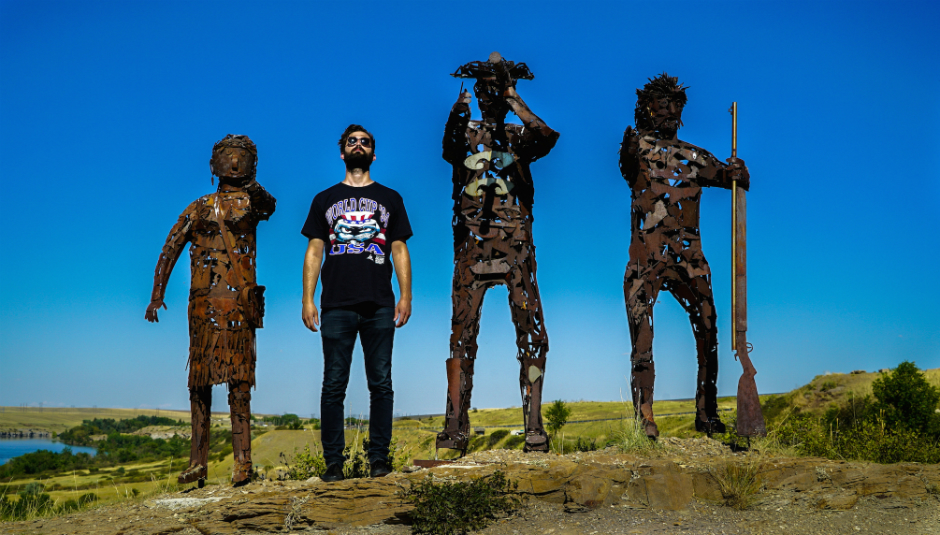“I never really thought, 'Oh yeah, gotta put out a solo project!'"
Chris Tomson doesn’t take himself especially seriously, which would explain why he just delivered that last line in an absurd approximation of a classic rock radio DJ. Further evidence to support that point is available in abundance on his new album, one that only came into being when Vampire Weekend, for whom he drums, were put into cold storage after touring extensively behind 2013’s Modern Vampires Of The City.
The band’s frontman, Ezra Koenig, went away to slowly piece together ideas for their next album, having resolved to take his time after wrestling with writer’s block last time out. Keyboardist Rostam Batmanglij and bassist Chris Baio both turned their focus to their own records, with the former taking permanent leave of the New York outfit in order to do so. The latter, meanwhile, put out the warmly-received The Names in 2015, and hit the road in support of it. Even after turning thirty, getting married and sorting out a mortgage, though, Tomson was the only member to feel a little adrift creatively as the group’s whirlwind maiden decade wound down.
Eventually, he got to work on more music in the basement of his Brooklyn home, demoing ideas on the piano at a glacial pace. Once he had enough for an album, he took those sketches to Nashville, where he and his opposite number in The Black Keys, Patrick Carney, transformed them into Youngish American, an album scored through with Tomson’s trademark warped wit and one that casts a wide stylistic net, alternating between fizzing post-punk (‘Pretty Good WiFi’, ‘Will I Be Known To Her’), eighties-inflected pop dramatics (‘Polo Grounds’), and contorted new wave (‘Flag On The Can’, which manages to be brooding and daft at the same time). As told to DiS from over the phone from New York, what started out as a way to kill time before Vampire Weekend whirred back into life turned into an opportunity for Tomson to step out front and centre, all of his idiosyncrasies on display.
DiS: When did you realise you wanted to make your own record?
Chris Tomson: It sort of snuck up on me. I knew, in a calendar sense, that we had a lot of time off, and that we were going to have an extended break before making another Vampire Weekend album. Music was and is the only thing I’m professionally qualified to do, and it’s all I’m interested in making, but I didn’t necessarily have a desire to put together my own record. I sat down at the piano for a while, and eventually, songs started to come along that I thought were good, and worth pursuing. It took a little bit of time to get to that point - where I thought, “this would be worth my while if I released it.”
Have you always worked on your own songs?
Not really. It’s all pretty fresh. There was a little bit of stuff that I wrote in college, and I did steal a line from one of those songs for this album, although it’s not really foundational – just something I always thought was cool. When the band’s cooking, I just write my own drum parts, and I guess that’s been my main focus for the last decade, essentially – just contributing towards the greater good. It wasn’t until I knew I was going to have a lot of time on my hands that the idea of ever really working on my own material came up.
Why did you gravitate towards the piano when you were writing?
I’d mainly been a guitarist before Vampire Weekend started, so when I volunteered and ended up sitting at the drums, I always thought that it was an asset to not have been super well-trained, and to have to figure things out using instinct. It wasn’t like I had certain tricks I could rely on, where I was good enough to just turn my mind off. The piano was something I’d messed about with but never really learned; I could play ‘The Entertainer’ when I was fourteen, and that was the extent of my formal training. My parents wanted to get rid of the piano from my childhood home, so I said, “You know what, guys? Let me take it”. I paid $250 to have it moved out to Brooklyn, and it just worked out well. I was sitting in my basement, playing around with it and not knowing what I was really doing, and happily it ended up bearing fruit.
Were you recording the songs as you went along?
I know from Vampire Weekend that it’s a good idea to demo general arrangement ideas as they came to me, but almost nothing you hear on the album is from me in the basement - the studio part didn’t happen until after I had all the demos down. I played them for Chris Baio, actually, and he was like, “Oh, you’ve got an album here”. I sort of needed him to tell me before I realised it for myself. “You’re pretty much done, man.” I was like, “Really?” We kept talking, and thought that Patrick Carney would be really good to produce it. I got his email, sent him a couple of the demos and just asked if he’d be interested, if he’d have the time. He had a couple of weeks free for me to go down to Nashville, so I headed there last November with these very shitty-sounding demos, and Patrick helped to craft them into real songs.
What do you think you got out of the whole process that you wouldn’t get out of the experience of making a Vampire Weekend record?
Oh, a bunch of stuff. I hope this isn’t a cop-out answer, but the biggest thing is context, really. With Vampire Weekend, it’s very different making an album when you just graduated from college at a friend’s studio than it is doing your third one when you’ve toured the world a few times. This record felt like another way of approaching things, and one that was no less valid. Obviously, I’m very much not the lyricist in Vampire Weekend, and it was interesting, because I’d had a decade of experience in this band that I continue to think is pretty good, and I don’t mean to be a dick when I say that. Without that context, though, I had to try to figure out what it was that I had to say or create that was different. I think this album somehow relates to the band in that sense, but isn’t beholden to it. I mean, some of the songs are actually about that, about coming to terms with what Vampire Weekend was and the incredible things we accomplished as a group, whilst sitting alone at a piano thinking, “OK, what else do I have to contribute?” That mental exercise really informed a lot of the album.
There seems to be a real tongue-in-cheek quality to a lot of the lyrics on the record, but beneath that, there’s hints of you picking up on the political climate, too, like on ‘Tell the Truth’. Was that a deliberate balance that you were trying to strike?
I think in my actual life, not just my musical life, I’ve always been drawn towards humour, even in terms of dealing with very serious things. I know that’s not true for everyone, but I’ve found that it’s the way that I can understand and process things better. If there’s some sort of level of levity, things resonate more for me. That said, it wasn’t something that was explicit when I sat down – you know, it was never, “I’m gonna write some fucking jokes, man!”
Was there a turning point at which you realised you were comfortable writing about themes that were a little deeper?
Definitely. The specific thing that lodged loose the lyrical aspect of this album was that I wasn’t very excited about how my voice sounded to begin with. Things weren’t going very well, so eventually, one day, I just put a shitload of distortion on my voice in Logic, and it somehow felt disembodied in a way that allowed me to turn off some of the more neurotic tendencies of my internal monologue. It was like a release, shouting in this distorted way, that let me write lyrics about things that I was feeling deeply. Some of those ideas were uncomfortable ones, and some of them were more well-worn, but somehow, extricating the external narrative from my internal one really helped.
Youngish American was written and recorded before last November’s presidential election. Has the result, and everything that’s happened since, changed your outlook on the album at all?
Yeah. I would say that the spectre of doom in the U.S. was present during the making of it, but it still didn’t seem like a realistic proposition. Most of the songs were written during the primary season, and certain aspects of what’s happening now felt almost silly to think would actually happen back then. They were in the air, though. We had a band rehearsal two days after the election, and I think all of us were not necessarily wanting to play; it was obviously a very odd time, and to me, it felt very dark. When we went in and sang some of the songs, they seemed a little different. A line like “Can I be more than just another sad white man?” came from a place of humour initially, but now felt a little more serious. With the way everything’s turned out, some of the tracks have changed their hue, for sure.
Why didn’t you put the album out under your own name? What was wrong with plain old Chris Tomson?
Well, my name is a perfectly fine one, although slightly boring, I’d say. I’m rarely the only Chris in the room, and Tomson – while the spelling’s a little bit strange – isn’t the rarest of names, either. Funnily enough, I had the inclination not to call it Tomson or Chris Tomson or whatever from the jump, and then a lot later on, when we were in the studio, Pat was on the phone talking to Brian Burton – Danger Mouse. Pat was telling him about the record, and Brian straight away said that I shouldn’t use my own name. I’d already had that inclination, but having somebody else say so really solidified it for me.
Where did ‘Dams Of The West’ come from, then?
I took a while to come up with it, actually. The origin of it was that I’d read some articles about the names of dams in the western United States. Specifically, there’s this one in California that’s sort of on the edge of breaking right now. There are these totems of infrastructure that are somewhat crumbling, and some people were arguing that it might be better to decommission them, and let the rivers run as they used to. That resonated with me, as somebody who was trying to legitimise putting out a rock and roll album as a straight white dude in 2017. That idea that these things that were built in the middle of the last century potentially being obsolete – I felt a camaraderie with them. Plus, even though I wrote the songs on my own, it felt like a group effort in the studio, with Pat and another guy called Roger Moutenot producing and the engineer, Mark, too. Obviously, it’s demonstrably a group onstage as well. It seemed like a collaborative project, and I like the idea of a band way more than a dude strumming a guitar somewhere. The name reflects that.
What’s the plan in terms of taking the record on the road?
I mean, I have one very specific reference point when it comes to how bands begin, which is Vampire Weekend. Obviously, that worked out very well, but when we came out originally, there was this narrative of it being an instant success. That was partially true, I guess, but I think people thought, “Oh, they didn’t do any work,” when actually, we did multiple tours across the U.S. in a minivan. We definitely did head out there before people gave a shit. I’m not trying to repeat anything and I certainly don’t expect the same results, but I think playing shows is just as important to me as making the record.
Any prospect of you crossing the pond?
I want to tour as much as possible, but at the same time, I’m a free market guy - I understand there has to be some sort of demand. We’ve just been touring the U.S. for two months, with a two week break. We’d truly love to come to Europe and the UK, if anybody’s interested, because the UK especially has always been so good to Vampire Weekend. I love playing shows there, and I have really fond memories of our early ones. I remember playing the Roadhouse in Manchester, our very first show when we flew over for the first time, and staying at some random motel at the side of the road - the Diamond Lodge, maybe? - where we were all crammed into the same room. Those little shows up in Scotland, in London, in Brighton, in Wolverhampton, those were some really good times.
What’s going to be next, once you wrap up Youngish American? Have you broken ground on LP4 with Vampire Weekend yet?
We’ve put our heads together, and the party line is that it’s being worked on. Saying anything more specific would create a timeline, and I don’t think that putting that kind of pressure on ourselves would be conducive to the work that’s being done, or the work that still has to be done. It’s happening, and there will be a record existing at some point, but I can’t say when yet.
Youngish American is out now via 30th Century Records.






















